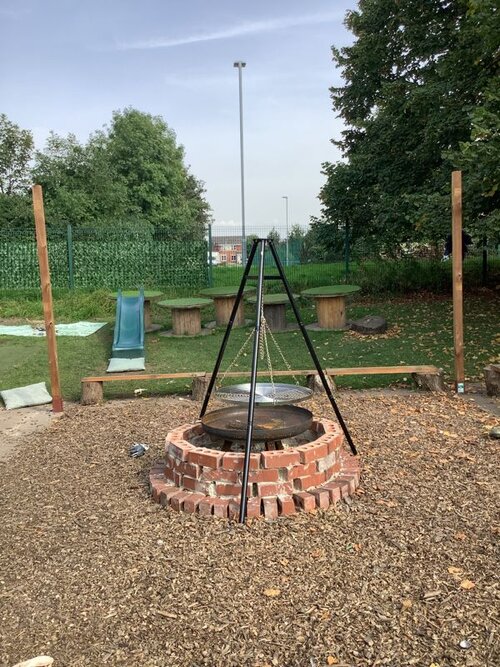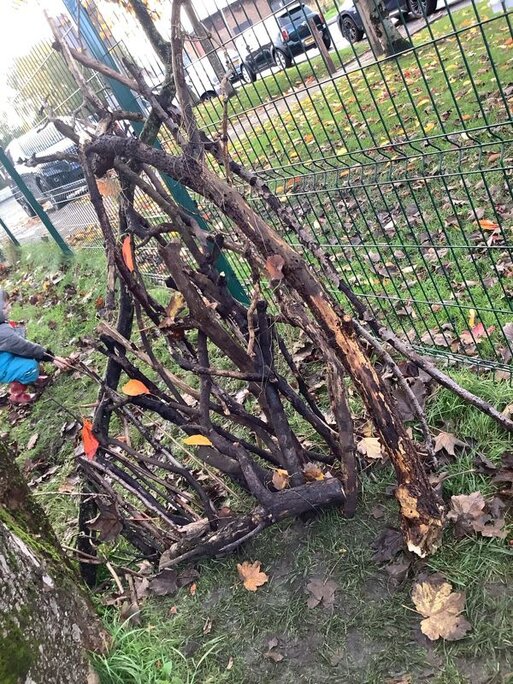
We aim to give food for thought as well as inspiring your creativity and
providing practical ideas you can’t wait to implement in your own settings!
Embracing Nature’s Classroom: Reflections on establishing a Forest School preschool
The concept of Forest School Preschools has gained significant traction in recent years as they can offer unique educational experiences for young learners. As we at Sunflower Childcare venture into the realm of outdoor education, it becomes evident that the success of such an endeavour hinges on the creation of a passionate and dedicated team. This article delves into the essential components of establishing a Forest School Preschool, which has been a new experience for my own setting. I will emphasize the importance of team leadership, parental involvement, having the right equipment as well as continuous training, and the ability to reflect and adapt in the face of challenges.
- 1. Leadership: The Key to Success
Establishing a Forest School Preschool requires visionary leadership that understands the essence of outdoor education. A dedicated team leader plays a pivotal role in setting the tone, fostering a love for nature, and steering the course toward a holistic learning experience. Leadership in this context involves not only guiding the team but also cultivating a culture of exploration, creativity, and respect for the natural environment.
When we first explored the idea of moving to a Forest School approach, I took a number of my team to visit two local forest school settings that I had previously met at an awards evening. Through organizing visits to other successful Forest School settings, this hands-on experience allowed my team to witness the positive impact of this approach first-hand and spark enthusiasm for change. This also facilitated open discussions during and after these visits. I encouraged team members to share their observations, concerns, and ideas with the other settings so that they knew how to overcome challenges and fears and test ideas for creating our own Forest School.
- 2. Bringing Parents Onboard
Parents are essential partners in the success of a Forest School Preschool. Communicating the benefits of outdoor education, addressing concerns, and involving parents in the learning process creates a collaborative and supportive community. Regular communication, workshops, and inviting parents to participate in outdoor activities help forge a strong bond between the school, parents, and the children, ensuring a unified approach to holistic education.
Successfully managing the transition to a Forest School approach at Sunflower and gaining the support of parents is a significant accomplishment. Effective communication played a crucial role in alleviating concerns and fostering understanding among parents.
We ensured we shared the benefits of the forest school approach, such as enhanced learning experiences, improved creativity, and a stronger connection to nature, which helped parents see the positive impact on their children's development. We addressed any potential concerns openly and provided a platform for parents to express their thoughts and ask questions which contributed to a sense of inclusion in the decision-making process.
In addition, we are now showcasing our success stories, testimonials, and even inviting parents to observe Forest School activities first-hand to allow them to witness the positive changes and benefits for their children. By actively involving parents and keeping them engaged throughout the transition, Sunflower succeeded in building a supportive community that understands and appreciates the value of the Forest School approach.

- 3. Equipping for Exploration
The right equipment is paramount for a successful Forest School Preschool. From weather-appropriate clothing to nature exploration tools, having the right gear enhances the learning experience and ensures the safety of the children. Team leaders should work collaboratively with educators to create a comprehensive inventory of materials that facilitate hands-on learning and foster a connection with the natural world.
Introducing Forest School equipment to children in a gradual and thoughtful manner is a key aspect of a successful transition to a Forest School approach. This process ensures that children become familiar with the tools and materials, promoting a sense of confidence, responsibility, and safety. We Began by assessing the children's current level of comfort and familiarity with outdoor activities and tools and consider the age and developmental stage of the children to tailor the introduction accordingly.
Initially we began the forest school journey by focusing on nature exploration without equipment. We wanted to encourage curiosity about the natural environment and foster a connection to the outdoors.
Then we introduced basic tools such as trowels, magnifying glasses and buckets. We started with items that are easy to handle and have a low risk.
The team then introduced new tools and demonstrated the proper use of each tool, emphasizing safety guidelines. We modelled how to interact with the equipment and explore nature respectfully.
Once this was embedded, we then allowed the children to explore the tools under close supervision, offering guidance and support as they began to use them, reinforcing positive behaviours and safe practices.
The practitioners at Sunflower planned skill-building activities involving the use of specific tools. For example, a planting activity with trowels or a bug hunt with magnifying glasses. This is a gradual cycle, and each child will be at different stages of use. By implementing a gradual approach to introducing Forest School equipment, we create a positive and empowering environment where children develop a sense of agency, curiosity, and respect for the natural world.
- 4. Continuous Training for Educators
Providing ongoing training opportunities ensures that educators stay updated on best practices, safety measures, and innovative outdoor teaching methods. Regular training sessions contribute to a team that is not only well-prepared but also enthusiastic about embracing the evolving challenges and opportunities of outdoor education.
At Sunflower we have invested in training several staff members; we already have one qualified Forest School Lead, one undergoing training, and another set to commence training in February 2024. This reflects our commitment to the principles and benefits of the Forest School approach at Sunflower. Training multiple staff members means that a larger number of children can benefit from the Forest School approach. It ensures that the principles are infused into various age groups and cohorts, maximizing the positive impact on the overall learning environment.
5. Reflecting on the Environment
Reflection is a cornerstone of effective outdoor education. Team leaders and educators should regularly evaluate and adapt the Forest School environment to optimize learning experiences. This involves considering factors such as seasonal changes, wildlife encounters, and the evolving needs and interests of the children. A commitment to reflection fosters a dynamic and responsive outdoor learning environment.
At Sunflower Nursery, our Forest School environment and practices are continually evolving to provide an enriching and dynamic learning experience for our children. We are dedicated to staying at the forefront of nature-based education, and as such, we consistently review and refine our approach. Our Forest School Lead, supported by a team of trained educators, is instrumental in driving this evolution. From incorporating innovative outdoor learning activities to regularly updating our curriculum with nature-focused elements, we are committed to fostering a deeper connection between children and the natural world. The ongoing training of our staff ensures that they are well-equipped to introduce new and engaging practices, allowing us to adapt to the evolving needs of our young learners. We also actively seek feedback from both our staff and parents, fostering a collaborative environment that embraces change for the betterment of our Forest School program. Through this commitment to evolution, we strive to create a nurturing outdoor space that sparks curiosity, instils a love for learning, and lays the foundation for a lifelong appreciation of nature.
- 6. Overcoming Challenges
Establishing a Forest School Preschool inevitably comes with challenges, from weather-related obstacles to logistical issues. A resilient team, guided by effective leadership, embraces challenges as opportunities for growth. The ability to adapt, problem-solve, and maintain a positive outlook in the face of adversity ensures that the Forest School remains a vibrant and enriching educational space.
At Sunflower, our transition to a Forest School approach has been marked by resilience, collaboration, and a shared commitment to providing an exceptional learning experience for our children. Moving to a Forest School model posed various challenges, from adapting to outdoor environments to ensuring safety protocols in a dynamic setting. However, through collective effort and a determination to embrace change, our team has overcome these hurdles. The challenges served as opportunities for growth, prompting us to rethink traditional educational paradigms and instigate innovative teaching methods. By fostering a culture of open communication, ongoing training, and a collaborative spirit among our staff, we've successfully navigated the intricacies of this transformation. The support and understanding of our parents have also played a pivotal role in making this shift smoother. As a result, Sunflower now stands as a thriving Forest School, where challenges have become stepping stones towards creating a nurturing and adventurous learning environment for our children.

Final thoughts…
Creating a Forest School Preschool is a transformative endeavour that requires more than just a love for nature; it demands a dedicated team committed to fostering a deep connection between children and the great outdoors. The success of such an initiative lies in effective leadership and a dedicated team, collaboration with parents, the provision of proper equipment, continuous training for educators, reflective practices, and a resilient attitude toward challenges. As we embark on this journey, let us remember that a well-led team is the driving force behind turning nature into a powerful and immersive classroom for our youngest learners.
With many thanks to Dawn Gibbons for writing this article.
Dawn is the operations manager at Sunflower Nursery and is a member of the EuHu Teacher Board.